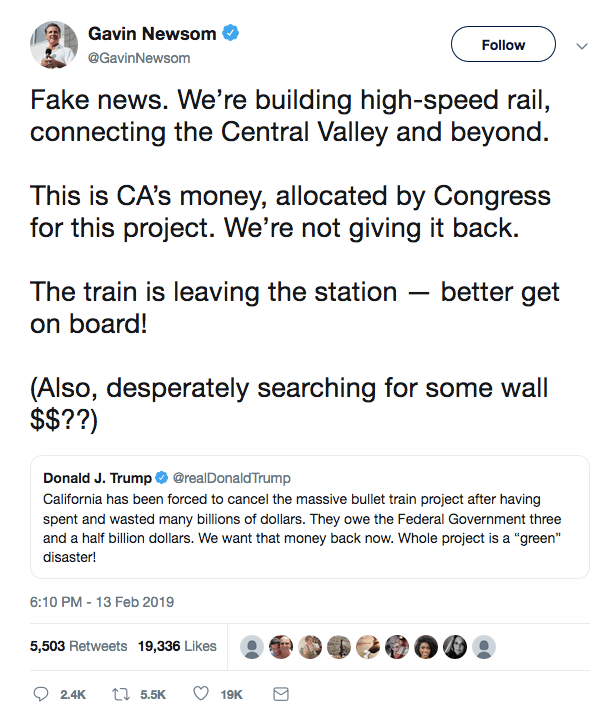The president resorted to his favorite communication tool when he caught wind of California Governor Gavin Newsom's equivocal support for the state's high-speed rail project. On Twitter, he wrote:
California has been forced to cancel the massive bullet train project after having spent and wasted many billions of dollars. They owe the Federal Government three and a half billion dollars. We want that money back now. Whole project is a “green” disaster!
In response, Newsom tweeted back:
Fake news. We’re building high-speed rail, connecting the Central Valley and beyond. This is CA’s money, allocated by Congress for this project. We’re not giving it back. The train is leaving the station — better get on board! (Also, desperately searching for some wall $$??)
To everyone interpreting Newsom's State of the State remarks as meaning that he is pulling the plug on high-speed rail (even though he said he was not): chillax. It's moving forward. In fact, Newsom said very little that wasn't already known about the program.
Lisa Schweitzer at USC captured the gist of Newsom's stance, writing, "Gavin Newsom announced yesterday that he was going to keep supporting HSR as governor, but that he committed to finishing the Fresno-Merced segment and is, for now, letting go of the likely secondary phases of getting the service into LA and San Francisco." Note that Newsom said he will finish environmental studies on the LA-to-SF phase, not let go of it entirely.
Newsom's phrasing about there now being "no clear path forward" for the completion of the project was unfortunate, to say the least. On the face of it, it's accurate, as anyone paying attention to the program's progress already knows. The final alignment details are still being worked out and fought over. Environmental studies are ongoing. Like any giant, multi-phase, statewide, multi-jurisdictional mega-project, plenty of funding still needs to lined up.
But that one phrase allowed the media and others to jump to the conclusion that high-speed rail must be dead, dead, dead. The take was surprisingly universal--except for Streetsblog and Senator Scott Wiener, as far as we can tell.
The frenzy happened in part because the media was listening to and reporting on itself, and racing to conclusions, which freaked out everyone with an opinion about high-speed rail.
So Trump was not alone in thinking that California was "forced to cancel" the project. At least his tweet gave Newsom the opportunity to clarify what he actually meant.
Another waste of energy in this media frenzy is that the governor's point on the importance of the Central Valley portion was completely lost. (Well, also, the rest of his speech, about housing and health care and other pressing issues, was largely ignored by the media). Newsom reminded listeners that the Central Valley is an important, vital part of California. This fell on deaf ears.
Fresno is the fifth biggest city in California, the 34th largest city in the United States. And it is growing. The cities in the Central Valley are not podunk rural towns in the middle of nowhere.
Schweitzer points out that Newsom's announcement was really about priorities.
This project is less of a governing priority than things like housing where he has come out swinging. He’s kicking the can down the road a bit on HSR, and I think not really in a bad way.
Newsom is differentiating himself from his predecessor, Jerry Brown, who strongly supported the high-speed rail program.
At any rate, as Streetsblog reported, Newsom made it clear that he is not abandoning the high-speed rail program. Rome, Shinkansen, and TGV weren't built in a day. By any definition, CAHSR is a long-term project that will outlast media cycles and elected officials' terms in office. One governor's ratcheting down the project's priority won't kill a project that already has more than a hundred miles under construction.
No one can predict the future, but there are some ways this whole miscommunication could improve the final outcome for high-speed rail. Tightening up project oversight--which Newsom said he would do--and finishing the Central Valley segment could produce the success that serves as proof of concept. This in turn could generate more support for finishing the network. In the end, Newsom could go down in history as playing a key role in establishing high-speed rail throughout the United States.
No, Mr. Trump, you can't have that money back, because California is building high-speed rail.






